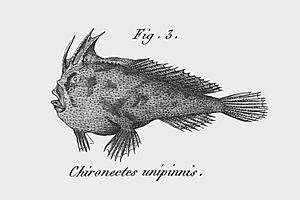Smooth handfish facts for kids
Quick facts for kids Smooth handfish |
|
|---|---|
 |
|
| Conservation status | |
| Scientific classification |
|
| Kingdom: | Animalia |
| Phylum: | Chordata |
| Class: | Actinopterygii |
| Order: | Lophiiformes |
| Family: | Brachionichthyidae |
| Genus: | Sympterichthys |
| Species: |
S. unipennis
|
| Binomial name | |
| Sympterichthys unipennis (Cuvier, 1817)
|
|
| Script error: The function "autoWithCaption" does not exist. | |
| Synonyms | |
|
|
Script error: No such module "Check for conflicting parameters".
The smooth handfish (Sympterichthys unipennis) is a very special type of fish. It's called a "handfish" because it uses its fins like hands to "walk" along the seafloor instead of swimming much. This fish might be extinct, meaning it no longer exists.
It used to live only in the waters near Tasmania, an island off the coast of Australia. Specifically, it was found in a place called the D'Entrecasteaux Channel.
Contents
What is a Handfish?
Handfish are unique fish that belong to a family called Brachionichthyidae. Instead of swimming all the time, they use their special, hand-like fins to move around on the bottom of the ocean. This makes them very interesting to scientists.
Discovery of the Smooth Handfish
The smooth handfish was first found by French explorers way back in 1802. They caught the only known specimen (a single fish) using a simple dipnet. This fish was then studied and given its scientific name, Chironectes unipennis, by a scientist named Georges Cuvier in 1817.
Where Did It Live?
This handfish was likely found only in the waters around Tasmania. It preferred the seafloor, which is called the benthic zone. This area was its home, where it would "walk" and live.
Why Did It Disappear?
It's not completely clear why the smooth handfish became so rare, or possibly disappeared forever. However, scientists believe it has a lot to do with human activities.
In the past, people did a lot of scallop and oyster harvesting in the D'Entrecasteaux Channel. This often involved dragging nets and equipment along the seafloor. This process, called dredging, destroyed the important habitat where the handfish lived. Without their home, it became very hard for them to survive.
Its Changing Status
For a while, the smooth handfish was officially declared extinct in 2020 by the IUCN Red List. This was a big deal because it was the first modern-day marine (ocean) fish to be given this sad status.
However, in 2021, its status was changed. Now, it's listed as "Data Deficient". This means that scientists don't have enough information to say for sure if it's extinct or if there are still some out there. They need more surveys and research to find out.
 | Chris Smalls |
 | Fred Hampton |
 | Ralph Abernathy |


